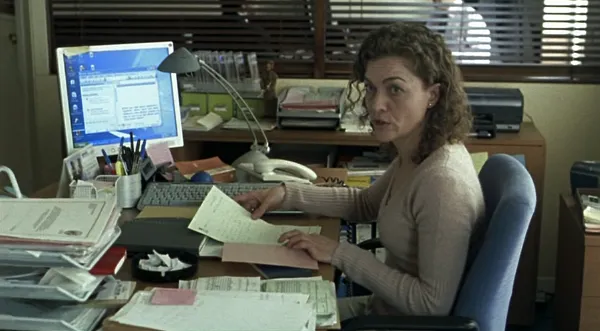Eye For Film >> Movies >> Mataharis (2007) Film Review
Mataharis
Reviewed by: Rebecca Naughten

A through-line in the work of writer-director Icíar Bollaín is her interest in representing a variety of female experience, in both private and professional spaces. The personal is shown to be political, often in a tangible way. Women in her films are regarded with compassion and no small amount of solidarity, whatever circumstances they find themselves in, whatever choices they make - and onscreen support is often found in the form of other women. So it goes in Mataharis, wherein three women at different stages of life manage to co-exist in the same workplace without being in competition with each other - instead they can be relied upon to step up when help is needed, whether that means offering childcare, a word of encouragement, or a blunt reality check. These women have got each others' backs.
The agency that they work for - and it's possibly a commentary on the limitations of their agency as individuals that they answer to an ill-tempered and not particularly progressive man (Fernando Cayo) - doesn't deal in the kind of espionage suggested by the film's title. Infidelities, disagreements between business partners, missing persons, and suspected thefts are their bread and butter jobs. But these cases all involve human relations - including those personal minutiae usually only seen by intimate acquaintances - and in crossing the line into the private spaces of others, each of the women finds an echo in their own lives and something that they have to resolve for themselves rather than their clients.

Carmen (Nuria González) has worked at the agency for ten years and is trusted by all who work with her (including the boss). She is working on the case of Sergio (Antonio de la Torre), who suspects that his business partner is cutting him out of deals but is subsequently puzzled to spot his wife appearing in Carmen's surveillance footage. Insight into Sergio's relationship - and the spark of genuine human connection that she shares with him - will lead Carmen to question her own marriage (she has more conversations with the household plants than she has with her husband (Adolfo Fernández)). Eva (Najwa Nimri) is returning to work after having her second child and is in a constant battle to balance her caring responsibilities with the demands of her job (although having a pram with you seems like good cover if you're following someone). The nature of the work she finds herself doing - investigating infidelities - sows seeds of suspicion in her mind about her husband (Tristán Ulloa). Meanwhile Inés (María Vázquez) is the youngest member of the team, full of enthusiasm and a desire to prove herself in the big city, but taking on a big contract for a multinational by going undercover will challenge her principles and sense of personal loyalties.
Bollaín's style is unobtrusive and serves the story, with the camera often sharing the restricted vantage point of the characters - we are placed alongside the women in not having the full picture available to us. This allows the focus to remain on the actors, and all three women are excellent at showing the private inescapably surfacing into public view despite their characters' best efforts to keep it hidden. Alongside her championing of perspectives that are rarely given centre stage, Bollaín's best qualities as a filmmaker are her empathetic presentation of characters and their predicaments, and the manner in which she grounds their lives in a recognisable social and economic reality.
Work matters to how these three women define themselves but it is also depicted as having material consequences - the threat represented by the precarity of work (and that work might be withheld as a form of punishment) hangs over several characters. While the stakes involved may seem small from the outside, they are potentially earth-shattering to the people experiencing them - the compromises that people make with themselves in the name of work, love, or just a quiet life, are put under the microscope by Bollaín, but in a non-judgemental way. This is a 'slice of life' film rather than an Erin Brockovich-style 'women against the system' one, but it is nonetheless noteworthy that in a narrative focused on working lives, women are front and centre rather than a background afterthought. This inclusion of women as active participants in the world shouldn't be so unusual that it stands out as something commendable - but it is, and we need more Icíar Bollaíns making films and creating windows into how that half of the world lives (and works).
Reviewed on: 05 Jun 2019

















